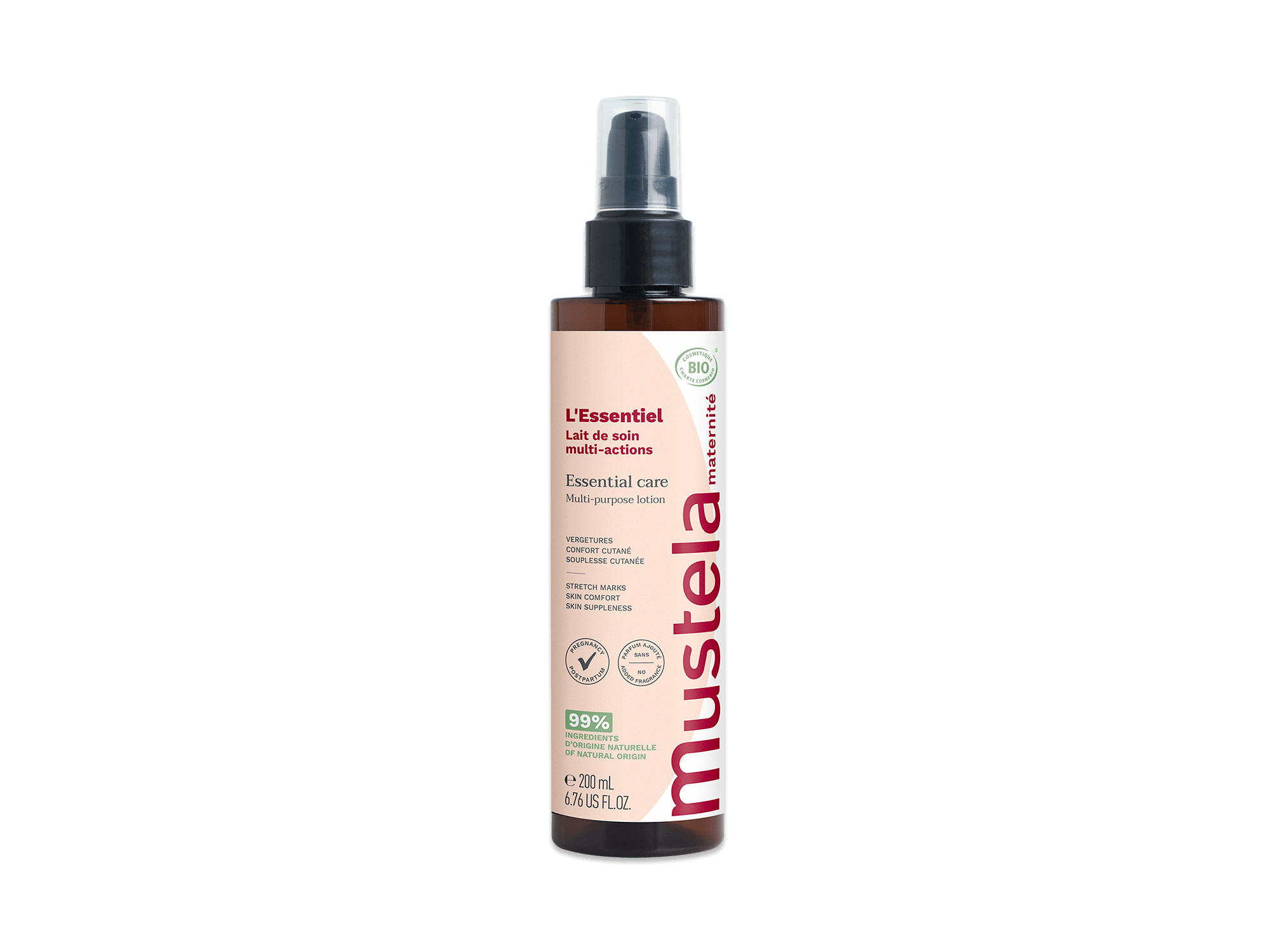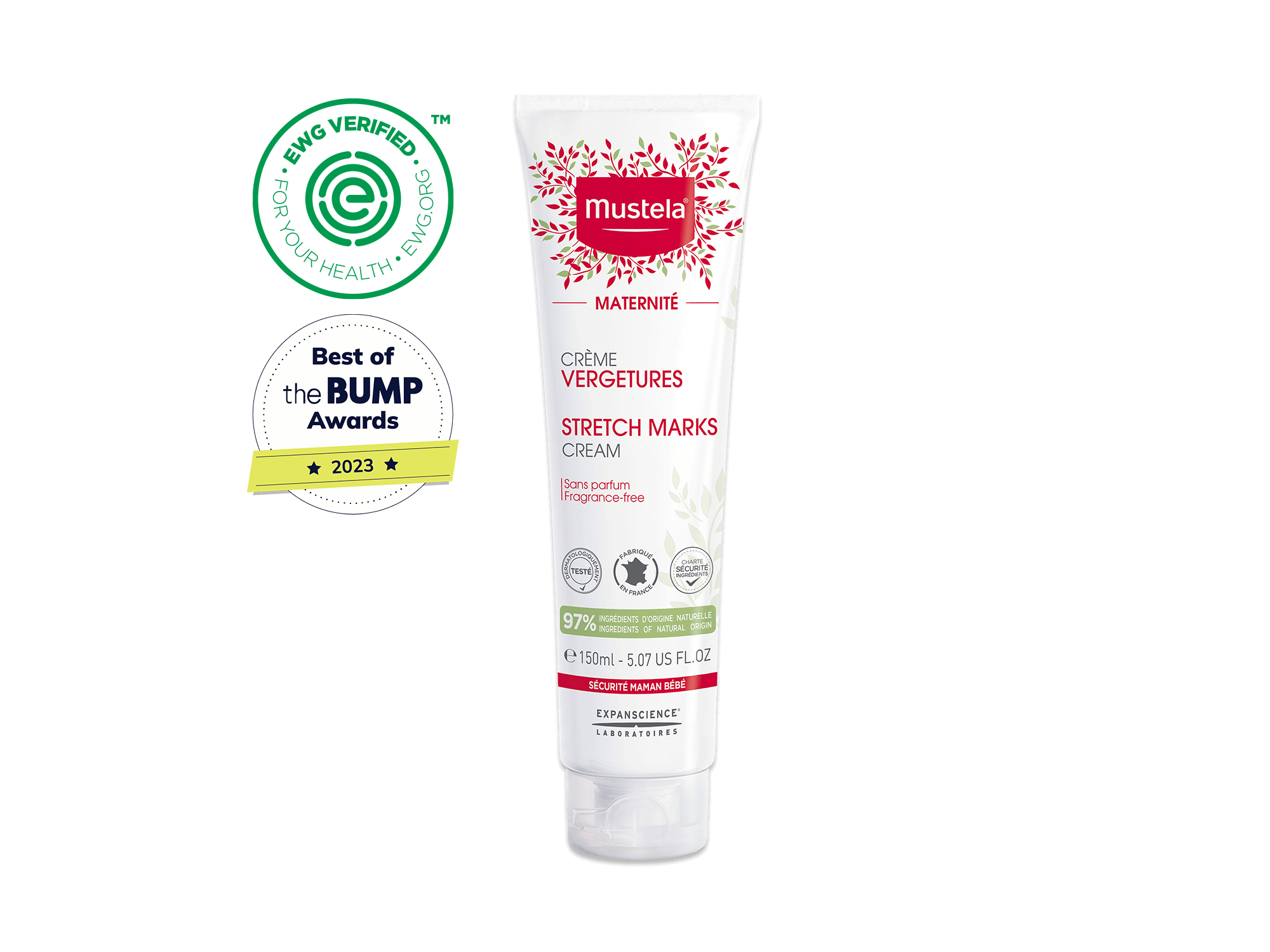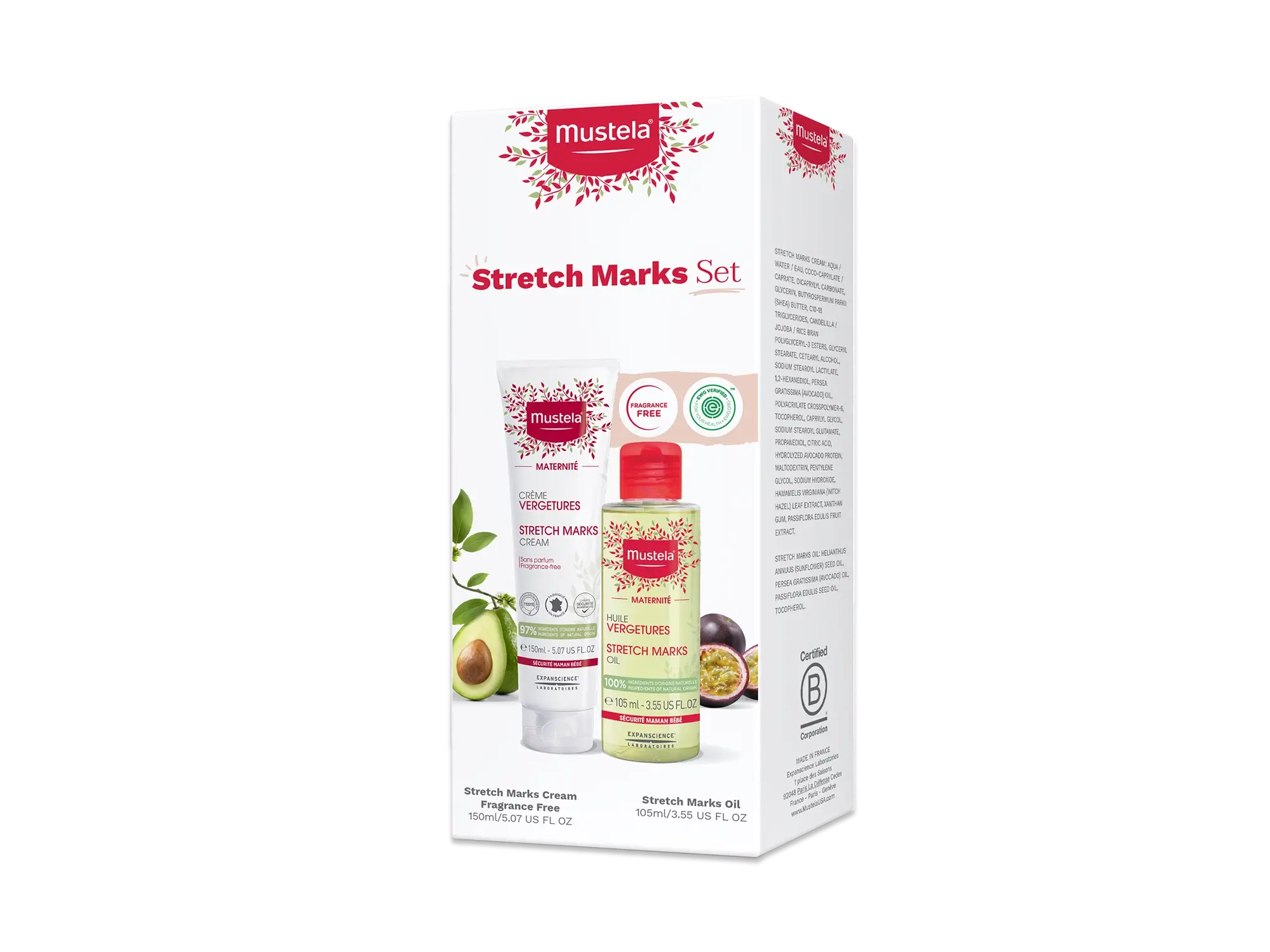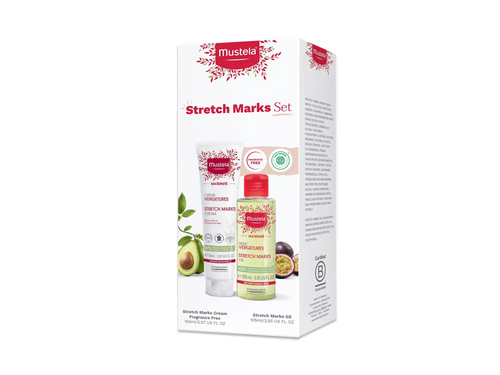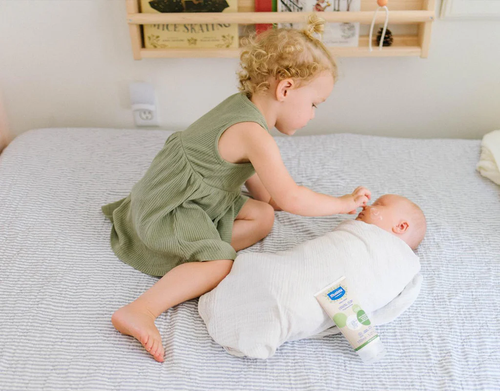With the arrival of your newborn baby, you may have questions and concerns about their feeding schedule. This is completely normal. From sleep schedule to feeding schedule, it’s all new to you.
You can rest easy because Mustela’s baby experts are here to address your questions and concerns about newborn feeding schedules and how often to feed your baby.
Table Of Contents
- General Newborn Feeding Schedule Questions
- Newborn Breastfeeding Schedule Questions
- Newborn Formula Feeding Schedule Questions
General Newborn Feeding Schedule Questions

How Can I Tell If My Baby Is Hungry?
It’s normal to think that crying is an indicator of hunger in your newborn, but according to the La Leche League, “Crying is a late feeding cue and indicates your baby is too hungry.”
It may take a while for your newborn to settle down once they get to this point, making feeding time difficult. It’s important to recognize early feeding cues before crying sets in.
It will take you and your baby a few days — or even a few weeks — to adjust and learn each other’s cues. But this adjustment period is important because responding to early feeding cues will help eliminate hunger cries.
Look for these signs to tell if your baby is hungry:
- Opens their mouth
- Turns their head toward your chest
- Places their hands and fists in their mouth
- Moves their head from side to side
- Whimpers or makes grunting sounds
How Can I Tell If My Baby Is Full?
Don’t worry about taking the bottle or breast away for fear of your little one getting too full. Newborn babies will stop nursing or taking a bottle during a feeding session when they’re satisfied. Some signs that your baby is full include:
- Pulls away from breast or bottle on their own
- Turns their head away from breast or bottle
- Appears content after a feeding session
How Can I Tell If My Baby Is Eating Enough?

You’re definitely not alone if this is one of your concerns when it comes to feeding your newborn. If you're breastfeeding, it’s hard to know how many ounces your baby consumes during a feeding session.
Keep an eye out for the following clues to tell if your newborn is getting enough nutrients:
- Produces four to six wet diapers per day
- Produces regular bowel movements on a daily basis (Use Mustela’s Diaper Rash Cream 123 to soothe your baby’s skin at each diaper change and help prevent diaper rash.)
- Sleeps well
- Stays alert when awake
- Shows weight gain at routine doctor visits
Keep an eye out for the following clues to tell if your newborn is not getting enough nutrients:
- Unsatisfied after feedings
- Little to no weight gain
- Cries or fusses often
- Seems hungry often
Follow up with your baby’s pediatrician if you have any concerns about your newborn’s eating patterns.
Tip: Keep Mustela’s Soothing Cleansing Wipes on hand during feeding time. These resourceful wipes not only provide the best relief during diaper changes but can also be used for quick, gentle cleaning of your baby’s skin after their feeding sessions.
Should I Put My Baby On A Feeding Schedule?
While scheduling feedings may seem like a good idea for your newborn, you might want to hold off doing so, at least for the first few months. Not feeding your newborn because you’re watching the clock could reduce your milk production and may even lead to engorgement.
Postponing feedings to follow a schedule may also upset your newborn and result in crying, which is a late sign of hunger. Instead, let your little one eat as often as they want.
Should I Wake My Baby Up To Feed Them?

You will need to feed your newborn around the clock. This means waking your baby up in the middle of the night or from a nap to feed them. For example, if it’s been three hours since your newborn’s last feeding, it’s time for a wake-up call.
To make this happen, it’s best to set your alarm. And your baby isn’t the only one who will need the alarm! You’ll want to keep hitting the snooze button, but don’t do it!
Your body needs to build up a good milk supply for your little one if you’re breastfeeding. And if your baby is bottle-fed, tag team with your partner or family member so you’re not the only one waking up around the clock.
When your days start running together because of your sleep schedule being thrown off, just remember that this time spent with your newborn baby is priceless!
How To Wake Your Sleeping Baby
Keep in mind that your newborn baby may not easily take the breast or bottle when it’s time to eat because they like to sleep...a lot! Newborn babies are not easy to wake up.
If you’re having a hard time feeding a sleeping baby, try gently unwrapping them if they’re swaddled. Then, remove everything but their diaper and place them on your chest. Skin-to-skin contact is always best and is designed for both moms and dads!
Babies have a keen sense of smell, so for the breastfed baby, put them directly on mom’s chest. Hopefully, they’ll catch the scent of your breastmilk and wake up.
If none of this works, gently massage your baby’s hands and feet, stroke their face, or change their diaper to keep them awake. Try sitting your baby up with one hand supporting their back and the other hand supporting their chin, and talk to them.
Whenever your little one starts stirring, bring them to the breast or bottle right away. Remember to stay calm and relaxed even if you’re tired. Tension and stress can affect your letdown and send stress signals to your baby, keeping them from nursing effectively.
Newborn Breastfeeding Schedule Questions

How Often Should I Breastfeed?
Keep in mind the size of your newborn’s stomach. It’s small! Therefore, your baby may need to eat on demand, better known as “demand feeding.”
Demand feeding means that you breastfeed your newborn whenever they appear hungry. The first few days after birth, it’s OK — and beneficial — to feed your baby on demand.
In the beginning, feedings may take place as often as every one and a half hours to establish your milk supply. It’s completely normal for your newborn to nurse eight to 12 times per day, especially within the first few weeks or even throughout the entire first month.
Breast milk is easier to digest, which is why breastfed babies tend to have more feedings in a day than formula-fed babies. So if you feel like you’re nursing all day, then you’re probably doing something right! As tiring as it may be, this is a good thing because it increases your milk production.
After the first month, feedings will decrease to seven to nine per day. And each month after that, the number of nursing sessions per day will continue to decrease.
Remember, a newborn should go no longer than four hours without nursing in a 24-hour period, even at night.
Why Does My Baby Want To Nurse More At Night?
If you feel like your baby wants to nurse for hours before bed, you’re not imagining it. You’re also not alone. Evening cluster feedings are common but can also be frustrating for new moms.
Cluster feeding is when your baby wants to eat more often than usual. It often happens in the evening but can also happen during the day. For some little ones, it may even occur around the clock.
There are a few reasons your baby may want to cluster feed at night. First, it’s a way for them to get extra calories. Babies burn a lot of energy during the day, and they may want to fuel up before bed.
Second, cluster feedings can help your baby sleep through the night. Nursing releases hormones that promote sleep, so your baby may be trying to self-soothe with food.
Third, night feedings are a way for you and your baby to bond. Skin-to-skin contact during breastfeeding releases oxytocin, the “love hormone.” This can help your baby feel calm and connected to you.
If you’re struggling with cluster feedings, remember that they won’t last forever. Eventually, your baby's feedings will naturally space out, and you might even miss these long nursing sessions.
How Long Does It Take To Nurse?
The answer to this question varies depending on the age of your baby and your milk supply. Newborns may nurse up to 20 minutes on each breast, which results in a 40-minute nursing session.
As your baby grows in size and age, they’ll become more efficient at nursing. When this happens, it may only take your baby a total of 10 to 15 minutes to nurse.
Other factors to consider in the length of time it takes to nurse include:
- Time for colostrum to change to milk (The first few days, you will produce a substance called colostrum. It will eventually turn into breast milk. When your breasts start to feel firmer, that’s a sign that your milk supply is increasing and changing. But remember some women’s milk may take more than a few days to come in.)
- Speed of your let-down reflex
- Speed of your milk flow (some are fast; some are slow)
- Position of your baby (latched on correctly)
- Sleepiness of your baby
- Distractibility of your baby
- When your baby starts nursing
Talk with your baby’s pediatrician if you have any concerns about the length of your baby’s feedings.
How Do I Count Feeding Intervals?
If your newborn nurses every two hours, mark the time of your baby’s feeding at the start of the nursing session, not when it ends. Some newborns nurse quickly and some may take a little longer, which is why you can’t count your newborn’s feeding intervals from when they finish nursing.
For example, if your little one begins nursing at 8:00 but it takes them 30 minutes to finish, write down 8:00 as the time of the first feeding — not 8:30. That would make 10:00 the start time of the second feeding session, even though it’s only an hour and a half after they finished eating.

How Often Should I Alternate Breasts?
Try to offer both breasts during each feeding to sustain your milk supply. Your baby may not take the second breast if they’re full.
Some women find it helpful to alternate breasts in the middle of each feeding session, while others prefer to switch breasts at each feeding so that they’re only nursing from one breast for an entire session and the other during the next session.
No matter which method you choose, be sure to keep track of which breast you offered last so that you’re giving both the same amount of nursing time throughout the day.
If you struggle to track which breast it’s time to feed from first, here’s a quick tip. You can slide a tiny paper clip onto your bra strap on the side you need to start with the next time you nurse. Then, move it to the other side during the feeding (or right after).
This tangible reminder gives your tired mommy brain one less thing to keep track of.
Sore Nipples
Your body is adjusting to a new life — on the inside and outside: You have a new baby and a new body!
During the first few days postpartum, your nipples may be a little sore from nursing. This can make breastfeeding miserable and uncomfortable.
Over time, your body does eventually adjust and sore nipples become a thing of the past! But to help keep your skin comfortable while nursing — especially during those first few days — try our Nursing Comfort Balm, which is a soothing and restorative nipple cream.
This lanolin-free balm moisturizes and protects your nipples, eases discomfort, and helps replenish and restore your skin during and after breastfeeding. Breastfeeding is now a painless pleasure!
Newborn Formula Feeding Schedule Questions

How Often Should I Feed My Baby?
Since your newborn’s tummy is so tiny, you’ll need to feed your baby formula every two to three hours during their first month. As their tummy grows, so will the length of time between feedings.
Because formula takes longer to digest than breast milk, formula-fed babies won’t get hungry as often. Typically after the first month, they will eat every three to four hours.
But the newborn feedings are not always mess-free. Spit-up can sometimes accompany them. Keep our Cleansing Wipes handy to clean up your baby’s spit-up, especially during late-night feedings. You’ll be too tired to give your baby a bath at this point — if they’re old enough for a bath.
Mustela’s gentle wipes can be used for everything from wiping your baby’s face or diaper area to cleaning their hands. But the uses and benefits aren’t just for babies. Parents, you can enjoy our cleansing wipes, too!
Moms, use them to remove your makeup and keep your skin smooth, clean, and healthy without the irritation often caused by other makeup removers. And, dads, use them for a quick clean up for your hands and face.
Our wipes are especially effective at gently removing dirt, grime, oil, and makeup!
How Much Formula Should I Give My Baby?

Within the first few weeks, make two- to three-ounce bottles every two to three hours for your newborn. Increase this amount after adjusting to their eating patterns. Look for the following cues to know when to start increasing your little one’s formula intake:
- Finishing a full bottle at each feeding
- Showing signs of hunger after each feeding
Newborns
Newborns drink about 1.5 to 3 ounces of formula every two to three hours. Increase the amount as your baby grows.
Two-Month-Old Babies
Two-month-old babies drink about 4 to 6 ounces of formula every three to four hours. Increase the amount when your baby is able to consume more formula at each feeding.
Can I Switch Formulas?
With the formula shortages of 2022, you may be scrambling to find a formula that works for your baby. If you’re one of the many parents who are struggling to find a particular brand of formula, you may be wondering if you can switch formulas.
The answer is yes. All formulas manufactured in the United States are required to meet the same nutritional standards. So any formula you choose (or can find) will be safe for your baby.
That said, it’s still important to stay within the same type of formula family if possible. For example, if you're feeding your newborn a cow's milk-based formula, don't suddenly switch to a soy-based formula without speaking to your pediatrician first.
Otherwise, you could cause tummy troubles for your little one.
Newborn Feeding Schedule: A Time Of Bonding

Now that you have answers to your questions about newborn feeding schedules and how often to feed your little bundle of joy, you can soak up this precious time with your newborn. It passes quickly, so embrace each feeding session while you bond with your brand-new baby.
You can rest assured that you’re giving your newborn the best start when you combine Mustela's products with your newfound feeding knowledge!



